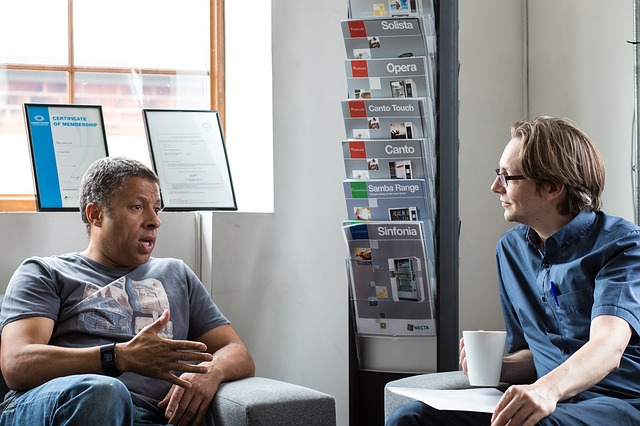Trust is important to make any type of relationship a positive one. This is especially true in the workplace.
If employees don’t trust each other, the entire atmosphere of the organization becomes clouded with discontent. Productivity suffers as people spend more time worrying about what is going to come crashing down on them unexpectedly. Nobody is willing to share information, skills or even help because they are scared doing so will cause a problem for them in the end.

When the distrust is for management, the situation can become even worse. A supervisor who is not trusted by employees will not be able to foster the dedication and concern for the company as a whole that is necessary for optimal success.
In essence, without trust in the workplace, the company is not going to reach its potential and may end up failing completely.
What Is Trust and Where Does It Start?
Trust is knowing that the person in question can be depended on to act in a way that benefits everyone involved and not just in their own interest. It is knowing that everyone will do their fair share and will perform with integrity and openness.
Ideally, trust is something we should all be able to do without hesitation, but that isn’t the case. As adults, we’ve gone through too many work situations where our trust has been damaged and most of us have some type of guard put in place to shield ourselves.
There are things that both supervisors and individual employees can do to help create trust, but it will be a gradual process. The most effective place to start is with management. As a supervisor, leading by example will help show employees they can trust you. They then can take those skills and apply them toward co-workers.
Let’s take a look at the many ways both employees and management can create an environment of trust in the workplace.
10 Ways You Can Lead the Way
Leading by example goes a long way. If you and your supervisors can effectively convey your trust in each other and your employees, this will trickle down. Create trust by incorporating the following things into your supervising style:
- Keep Promises: Dennis and Michelle Reina, both PhDs and co-founders of the Reina Trust Building Institute and authors of two books, include this as one of their most important components of trust-building. This includes both following through with what you say you will do and doing so in a timely manner. Promises are easy to make but people need to know they can count on you to follow through.
- Do Team-building Exercises: These exercises can be as simple as having someone who specializes in team-building come in for an afternoon to facilitate a workshop. It can also get more involved by planning a weekend team-building camping trip or having employees participate in another planned activity.
- Don’t Micro-manage: Show your employees you trust them to get done what needs to be done. Don’t give into the urge to constantly check on the progress of a project. You can set up a schedule for feedback but allow whoever is responsible for the project a chance to complete it in a manner that best fits with their personality. Your trust will give them the confidence they need to give it their best.
- Get Involved: Be willing to roll up your sleeves and help out on projects. This shows employees that you don’t consider yourself better than them.
- Know Your Employees: Your employees have names, families, and personalities. Take time to know who they are outside of work and let them know it matters to you.
- Reprimand in Private: There are times when you have to reprimand an employee. That can’t be avoided. Make sure it is done in private. Calling them out in front of others creates hard feelings that won’t soon be pushed aside.
- Admit Mistakes/Lack of Knowledge: You aren’t perfect, and you don’t have to be. An article in Harvard Business Review states that your willingness to show this human side of yourself will allow others to respect you more and listen more closely to what you do know.
- Listen Productively: Forbes has a great interview that covers many aspects of trust-building, with listening effectively being near the top of the list. When an employee comes to you, put aside other things and actually listen. Try to understand what is between the lines and acknowledge what is being entrusted to you.
- Confront Conflict Quickly: Don’t allow any conflict to continue in hopes that it will play itself out. Sit down with those involved and work on a solution that will benefit everyone. Don’t play favorites.
- Be Open: Staying inside an office with your door closed all the times cuts you off and makes employees feel you don’t care. There are times you need privacy to complete your work, but be willing to have times when your door is open. Walk the floor and ask questions. Even if you know answers, asking an employee to explain what they are accomplishing makes them feel that you count on them and they will try to be worthy of that trust.

10 Ways to Create Trust Employee-to-Employee
You sometimes spend more time with your coworkers than you do your own family. Being able to trust them to have your back and having them know you have theirs will make the workplace a much better place. Here’s how to create trust with your teammates:
- Be Present: Show up on time and be ready to jump in and work whenever and wherever you are needed.
- Offer/Ask for Help: When you see someone struggling with a project, be willing to help out even if they haven’t asked. Also, be willing to admit you need help at times by asking. This makes others feel you trust them and they will trust you in return.
- Share the Glory: Be willing to give credit to everyone involved in a project and don’t try to take credit for all the success of a project. Every project is a team effort in some way.
- Get to Know Your Coworkers: Learn about who they are as people outside of the workplace. Congratulate them on outside successes, ask about their families.
- Reach Out: If you sense a coworker may be struggling with something personal, reach out and ask. Maybe having someone to talk to will make all the difference to them at this time.
- Don’t Place Blame: If a project fails, don’t look for someone to blame. Instead, work with team members to find out what can be done differently to make it successful the next time.
- Avoid Gossip: People know that if you talk about others behind their backs, you’ll do the same with what they share. They won’t trust you to keep a confidence.
- Speak Up: If you see something is being done that is unfair, speak up. Let the wronged person know they aren’t alone.
- Share Knowledge: In an article published in Inc., global chair, James Kerr, lists this as one of the essentials of trust-building. Be willing to share what you know whether it is skills or company insight with others. There will be a time when that person may have knowledge that they will share with you. In the end, you both grow.
- Give Praise: Be willing to acknowledge when a coworker does something good. Whether it is thanks for help or the fact you noticed they learned a new skill, let them know someone noticed.

What Will You Do to Create Trust?
When there is an atmosphere of trust throughout the entire company, everyone begins to look forward to coming to work. They want to keep that trust by giving it their all. Production increases, conflict lessens, and everyone benefits.
When you create trust, it allows your company to soar to its greatest potential because everyone shares the common goal of doing what benefits the company as a whole.






